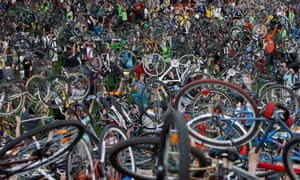Poll by Guardian and partner papers finds Europeans pessimistic but proactive before crunch Paris climate talks

Among those who answered the questionnaire in English – mainly respondents in the UK, but also some from the US, Canada, Australia and across Europe – 64% were less optimistic than they were five years ago that humanity would be able to avoid dangerous climate change, 12% were more optimistic and 24% said they felt the same as they did in 2010.
The Italians were the most hopeful, with 26% saying they felt more optimistic about the issue now than they did five years ago and 41% saying their feelings had not changed on the issue.
Out of more than 6,000 self-selecting respondents, many expressed dismay at the slow pace of political action on climate change.
In the UK, there was a strong tendency among respondents to try to reduce their personal carbon footprint. Individuals focused on cutting back on eating meat, switching off appliances, changing the way houses are heated and swapping to low-carbon forms of transport.
“I don’t drive, I cycle or take public transport. I choose to live a vegetarian lifestyle and I switch off all electronics when not in use. It’s only small steps, but if the whole world followed with little things like this, it would have a huge overall impact in reducing carbon emissions,” said Lucy Ambler, from Manchester.
Some respondents had dramatically altered their lives to reduce their impact on the environment, such as Annie, from Devon. “I haven’t taken a plane in 20 years, I have been vegan for 20 years (and vegetarian for 45 years), I try to use my car as little as possible. I produce in my home much more energy than I use, I only use rainwater to flush the loo, I try to buy only second-hand clothes and attend clothes swaps,” she wrote. “I have helped create a community orchard with my neighbours, I grow a lot of the food I eat. I have stopped owning pets (who consume meat) and instead welcome wildlife in my garden, I do not use Wi-Fi, I go round various public buildings turning lights off.”
Respondents from around the world spoke of trying to cut down their transport emissions, with many saying they minimised their car use by cycling and using public transport. Many also tried to reduce the number of plane trips they went on each year. “I have never flown yet,” wrote one German respondent, in the 45-54 age bracket.
A number of respondents spoke of their decision not to have children because of environmental concerns. Luke, in the 35-44 age bracket and from the UK, said that as well as adopting a vegan diet, buying local produce and eschewing plastic bottles and bags, he had decided to adopt rather than having biological children.
Several respondents expressed a sense of despair that no matter how much they changed their lifestyles, unless worldwide political action occurred, it would make no difference.
“Anything I do would be negated by emerging economies and China,” said Connor, in the 55-64 bracket and from Lancashire.
In contrast, one respondent from Mauritius, an island whose existence is threatened by rising sea levels, laid the responsibility for action at the feet of nations such as the UK, France, Germany and Italy.
“It is not my responsibility. Let those who have a comfortable GDP, live in luxury, enjoying the very best in life, do the planet cleaning. Let those who have created riches by destroying the planet assume full responsibilities,” Cader wrote.
According to the survey, when it comes to individual action to reduce emissions, Italians favour cycling, insulating their homes and installing solar panels. One respondent, Francesco Barsotti, said he used his bicycle for all journeys under 60km (37 miles).
Gildo Serenego, a resident of Lombardy, said he was more worried about climate change than he used to be and had started turning down his thermostat and limiting the use of his car. “I tend to avoid using air conditioners in the summer and try to get food from the areas closest to me.”
Germans prefer solar panels, changing windows for better insulation, minimising car use and travelling by train – a testament to Germany’s excellent rail system. “Our family needs less and less energy every year and we haven’t had a car for 31 years and we use local produce,” wrote Lesum, from Frankfurt.
Other Germans spoke of joining tree-planting projects, ordering tap water at restaurants – environmentally friendly because it is not packaged or transported – and one respondent said he used warm water just twice a week in his energy-efficient house.
While 30% of French people said they were doing nothing to reduce their emissions, a popular response among those who were taking action was to buy green electricity. Among the actions that French respondents thought their government should take was introducing policies to limit car use, introducing incentives for local food producers and a review of energy policy.
One French respondent implored the government: “Introduce unpopular laws for five or 10 years, that will produce [emissions] savings in the long term. Don’t be so preoccupied by short-term electoral problems.”
English speakers are the least optimistic about humanity’s chances of avoiding dangerous climate change, according to a survey of readers in English, French, German and Italian conducted by the Guardian, Le Monde, Süddeutsche Zeitung and La Stampa.

